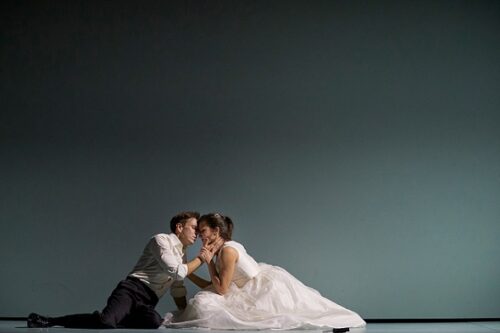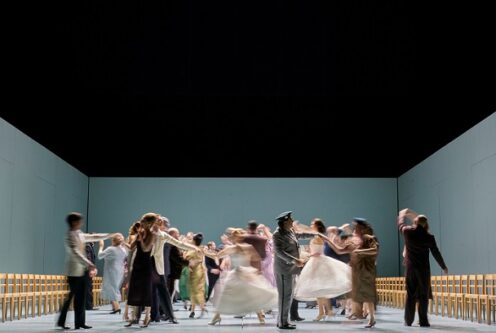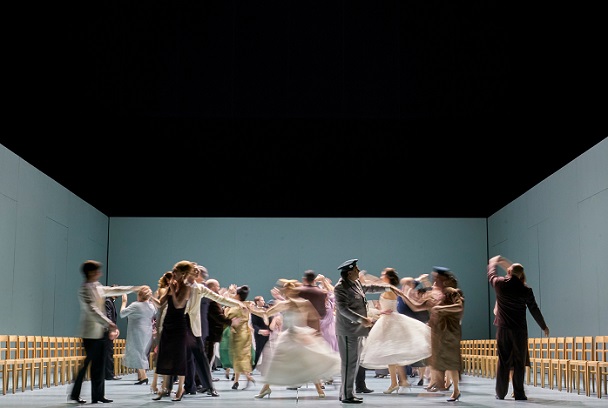 Switzerland Gounod, Roméo et Juliette: Soloists, Dancers, Choir of Zurich Opera, Philharmonia Zurich / Roberto Forés Veses (conductor). Zurich Opera, 10.4.2023. (MF)
Switzerland Gounod, Roméo et Juliette: Soloists, Dancers, Choir of Zurich Opera, Philharmonia Zurich / Roberto Forés Veses (conductor). Zurich Opera, 10.4.2023. (MF)

Production:
Director – Ted Huffman
Set – Andrew Lieberman
Costumes – Annemarie Woods
Lighting – Franck Evid
Choreography – Pim Veulings
Dramaturgy – Fabio Dietsche
Choir – Ernst Raffelsberger
Cast:
Juliette – Julie Fuchs
Roméo – Benjamin Bernheim
Frère Laurent – Brent Michael Smith
Le Comte Capulet – David Soar
Mercutio – Yuriy Hadzetskyy
Stéphano – Svetlina Stoyanova
Tybalt – Omer Kobiljak
Gertrude – Katia Ledoux
Le Duc de Vérone – Valeriy Murga
Le Comte Paris – Andrew Moore
Gregorio – Jungrae Noah Kim
Benvolio – Maximilian Lawrie
Juliette kisses the lifeless Roméo one last time, then stabs herself. Unlike Shakespeare, who does not afford the theatre history’s most famous lovers the opportunity of a verbose farewell, the deeply religious composer Gounod delays Roméo’s death allowing them an onstage reunion for a final duet in which they ask for God’s forgiveness for their suicide before they die in each other’s arms. A remarkable feat for a couple of 14-year-olds.
The New York-born director Ted Huffman, known to Zurich audiences from his 2017 Madama Butterfly and especially his 2021 world premiere of Stefan Wirth’s Girl with a Pearl Earring, creates a neutral – you might even say radically reduced – staging with severe 1950s-style costumes by Annemarie Woods.
Huffman devises the opening ball as a ‘cotillion’, a term used to this day in the US, a ball for debutantes organised to introduce the offspring of the rich and famous to society. This society is one of strict rules, leaving no breathing space for our star-crossed lovers. The rules and conventions are made and enforced by Juliette’s father Count Capulet (English bass David Soar), a rough misogynist bully. The Count’s cheek-to-cheek dance with his daughter leaves us feeling queasy – a nod to Donald Trump, who (in)famously boasted, on live television, that he might have dated Ivanka if she hadn’t been his daughter.

As does the directing, the set follows a resolutely ‘maximum reduction’ approach. The stage by Andrew Lieberman is an empty space of three turquoise walls. The only props at the singers’ disposal are chairs, bottles, the couple’s vials and a number of knives and daggers. No balcony either. As the drama evolves, the back wall moves ever closer to the front, lessening the couple’s room for manoeuvre and emphasising their estrangement from society and their families.
The director’s intention is to keep the focus on the two protagonists’ development from lightheaded teenagers to tragic victims of adult implacability. However, except for the dynamically choreographed and action-packed mass scenes in the first (opening ball) and the third act (deadly fight between the Montague and Capulet families), the cast – and admittedly the audience, to some extent – is left alone with the essence of the story, which despite its dramatic ending isn’t all that substantial. There are also a few outright oddities, for example as Frère Laurent the priest (Brent Michael Smith, with a soothing bass voice) remains seated on one of the many chairs as he performs the couple’s wedding and again when presenting Juliette with the vial containing the sleeping potion. Both occasions would have warranted more engagement with the situation’s significance.
The cast is led by two superstars of the French repertoire, soprano Julie Fuchs in her role debut as Juliette and Benjamin Bernheim, a habitué as Roméo. Both have a long-standing relationship with Zurich Opera, Fuchs is a former ensemble member and Bernheim a member of the International Opera Studio. On opening night, Fuchs in particular fell slightly short of expectations. She is a versatile and brilliant singer and actress. Her Juliette went through a moving development from the giddily impatient teenager in the first act – a beautifully memorable ‘Je veux vivre’ – to the tragically lost lover in the finale. And yet she seemed to be holding back; something Fuchs may well remedy in upcoming performances. Bernheim’s tenor voice is at times mellow, then again strong, occasionally metallic and always enthralling. And he is a convincing actor.
The opera is built around four love duets illustrating the couple’s passionate roller coaster into disaster. Fuchs and Bernheim take on the challenge set for them by the director and use the amply available space to act out their emotional journey. Although their roles were well executed, the couple did not take my breath away.
To me the evening’s real surprise and highlight was Bulgarian mezzo-soprano Svetlina Stoyanova in her debut as Stéphano, Roméo’s friend. With only one chanson of her own, she brought the entire space to life with her perky acting and enthusiastic singing. Stoyanova powerfully modulated between forceful presence and touching youthful purity longing for love. Mercutio, Ukrainian baritone Yuriy Hadzetskyy, was a tad stiff in his stage presence and French mezzo-soprano Katia Ledoux gave a strong performance as Gertrude, the nurse tending to Juliette and her troubles.
Roberto Forés Veses conducted the Philharmonia Zurich in a good, precise performance. Even if at times the strings came across as a bit heavy, on the whole conductor and orchestra created a fitting musical and emotional backdrop for the unfolding drama onstage. The chorus, directed by Ernst Raffelsberger, was as reliable a backbone for the choral scenes as ever.
In summary, I was left somewhat wanting after the performance. But given the enthusiastic applause for the cast I would invite others to form their own view, either live on 16, 22, 25 and 28 April and on 4, 7, 13 and 18 May 2023, or on television. The premiere was recorded by ARTE.tv and will be available in video-on-demand format for 90 days (click here).
Michael Fischer
